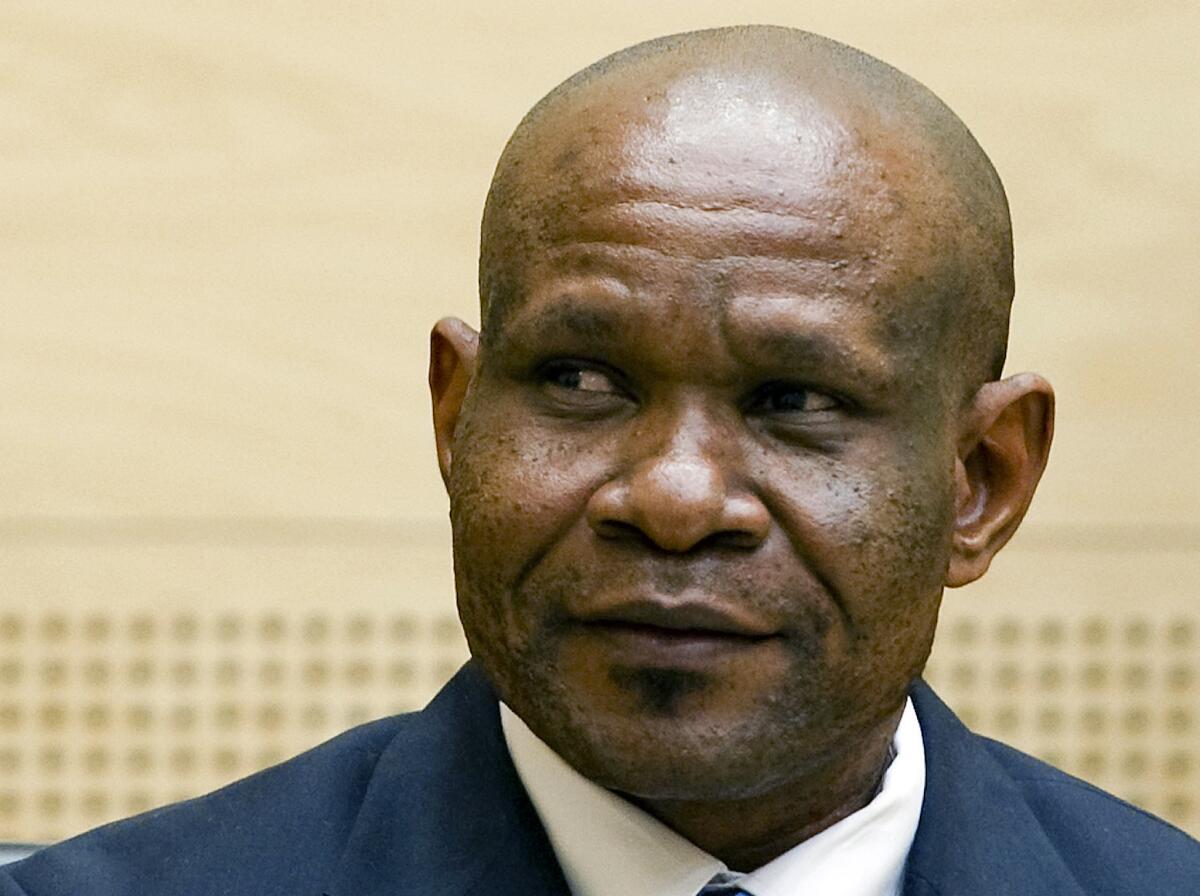Congo rebel leader acquitted on war crimes charges

- Share via
A rebel leader accused of leading a brutal attack on a Congolese village nearly a decade ago was acquitted Tuesday by the International Criminal Court, which said prosecutors failed to prove beyond a reasonable doubt that Mathieu Ngudjolo was responsible for the mass rapes and murders that devastated the town.
The decision was widely seen as a setback for war crimes prosecutors who already face steep obstacles in persuading witnesses to come forward and testify. It is the second verdict ever handed down by the court, which earlier convicted former warlord Thomas Lubanga of using child soldiers in the same Congolese conflict.
As Ngudjolo is acquitted and freed, “Congo has been spiraling into violence. Rebel groups have been gaining strength. In the middle of all that, this sends a dangerous signal,” said Michael Scharf, director of the International Law Center at Case Western Reserve University. But “they put all their eggs in one basket and it turned out they didn’t have enough evidence.”
Another set of rebels accused of abuses and now locked in talks with the Democratic Republic of the Congo cheered the Tuesday decision. “All those [who] were brought to the ICC in the Ituri case were innocent,” M23 chief negotiator Kambasu Ngeve told the Associated Press.
The court emphasized that its decision did not mean that no crimes were committed in the village on that day, nor did it mean it found Ngudjolo innocent. Outside experts point out that the case focused solely on the attacks on the village of Bogoro, which means Ngudjolo could conceivably land in court again over other charges tied to the conflict that killed tens of thousands of civilians and fueled torture and rape across the Ituri district in eastern Congo.
“Unfortunately, there were many massacres in Ituri,” said Geraldine Mattioli-Zeltner, international justice advocacy director for Human Rights Watch. “This begs the question for us: Why do such a small case?”
Bringing another case could be difficult, experts say. Fearful witnesses are already reluctant to step forward in war crimes cases and might become more so after seeing Ngudjolo freed, Scharf warned. Names have been improperly leaked by the defense in other such tribunals, despite rules that are supposed to protect their identities, he said.
In Congo, in particular, renewed rebellion and bloodshed in the east make it even more difficult to convince witnesses that they and their families can be protected. Years after the bloodshed in Ituri, the M23 rebels have terrorized and looted villages as they overtook North Kivu province this fall, far from a weak government that has failed to ensure security.
Moreover, the court is strapped for resources, which might make it reluctant to pursue Ngudjolo again. Human Rights Watch contended the decision should galvanize efforts to bring others to justice for atrocities in the Democratic Republic of the Congo, especially government officials in Congo, Rwanda and Uganda suspected of funneling weapons and money to rebel groups.
Human Rights Watch also said the court needed to strengthen its investigations. Defense attorneys were able to produce school records for witnesses who were alleged to have fought under Ngudjolo as children, weakening the case against him, Mattioli-Zeltner said.
Others were reluctant to criticize the narrowness of the case.
“I don’t think it’s fair to second-guess the prosecutor” for pursuing a case solely based on Bogoro, said Michael Newton, a Vanderbilt University professor oflaw. “When there’s enough evidence to prove even a narrow case, the pressure is to move as quickly as possible. Victims want to see justice.”
However, Newton said the acquittal could spur prosecutors to pursue a more straightforward argument that commanders are ultimately responsible for their forces, instead of the “arcane” and sometimes harder-to-prove principle they have relied on in the past.
Another militia leader accused in the attack, Germain Katanga, is still facing charges and has yet to be handed a verdict. Prosecutors also have 30 days to appeal the Tuesday court decision but will not be able to present any additional evidence.
The Tuesday decision comes as another war crimes court is under pressure for rejecting charges against a string of suspects. Over the last month, the Yugoslav war crimes court in The Hague overturned the convictions of two Croatian generals and acquitted the former prime minister of Kosovo, angering Serb nationalists who allege the court is biased against them.
The ICC, in turn, has struggled to bring fugitive suspects to justice, including M23 rebel leader Bosco Ntaganda, who has lived openly in the Congo despite being wanted on charges including murder, rape and forcing children to be soldiers. It cannot force countries to hand over suspects.
A decade into its existence, “these events show the weakness of the court,” Scharf said. “This month has been a month of setbacks. It’s a wake-up call that the challenges ahead are still great.”
ALSO:
Eastern Congo rebels thrive on fear, chaos
Gunmen kill 5 anti-polio workers in Pakistan
South Africa leader Jacob Zuma wins second term as ANC chief
More to Read
Sign up for Essential California
The most important California stories and recommendations in your inbox every morning.
You may occasionally receive promotional content from the Los Angeles Times.









